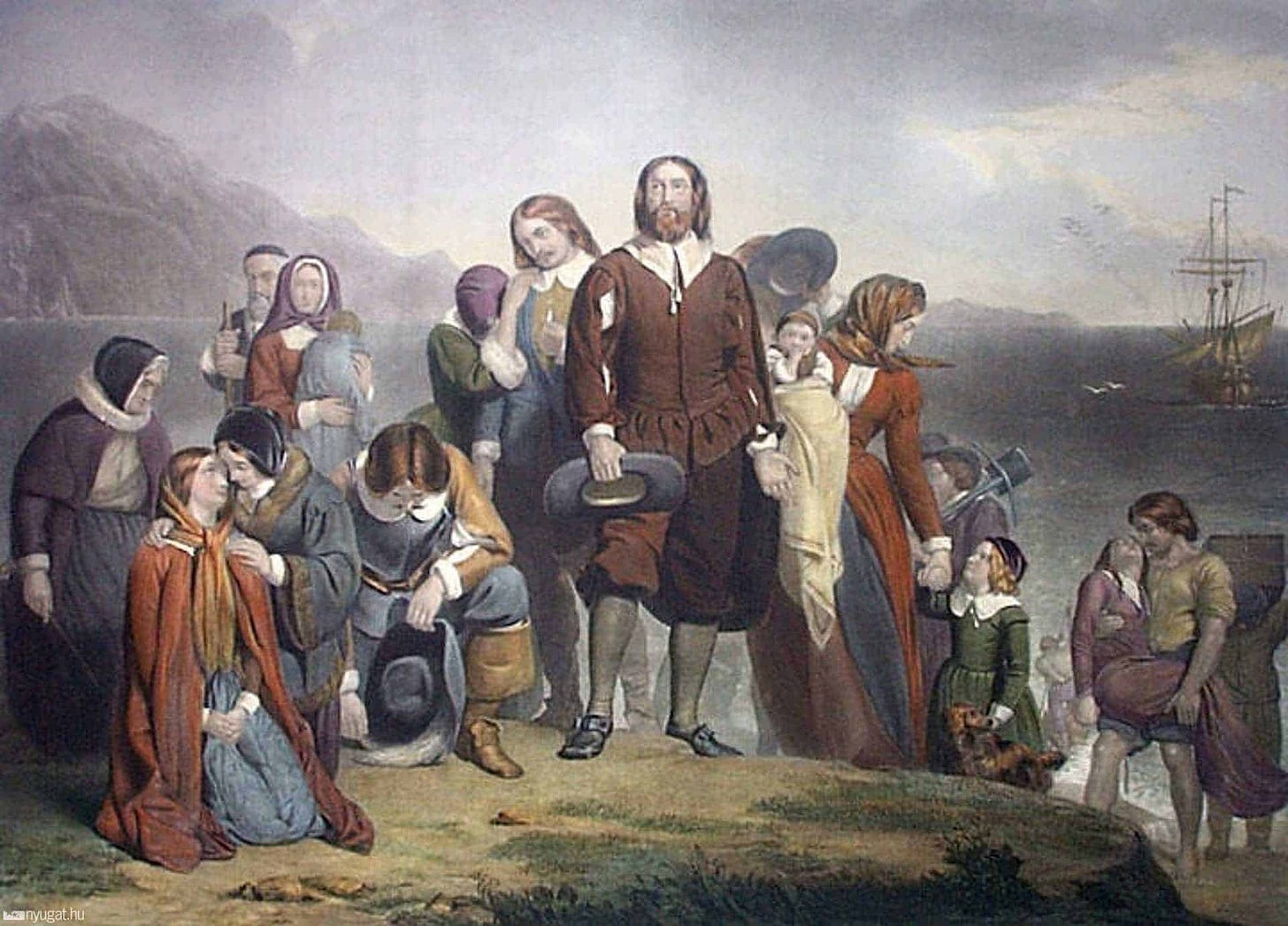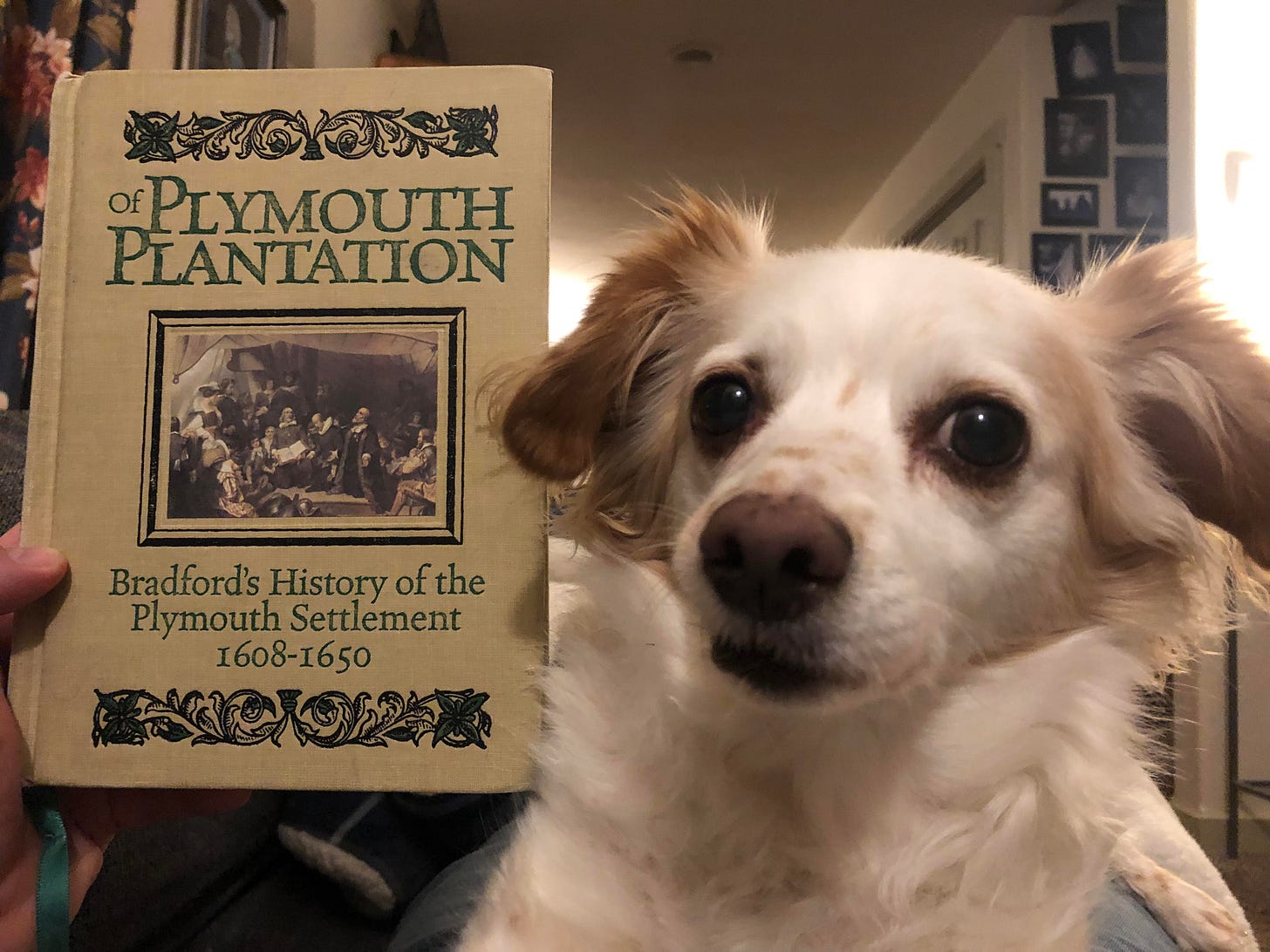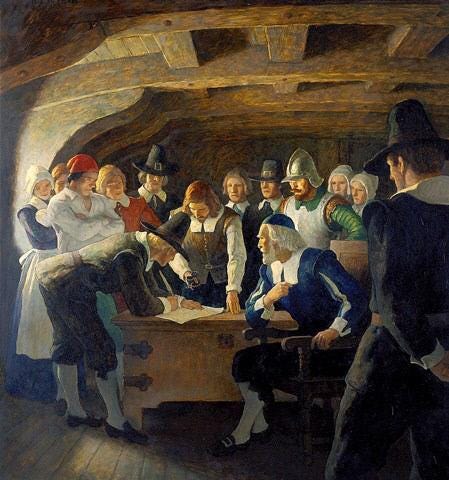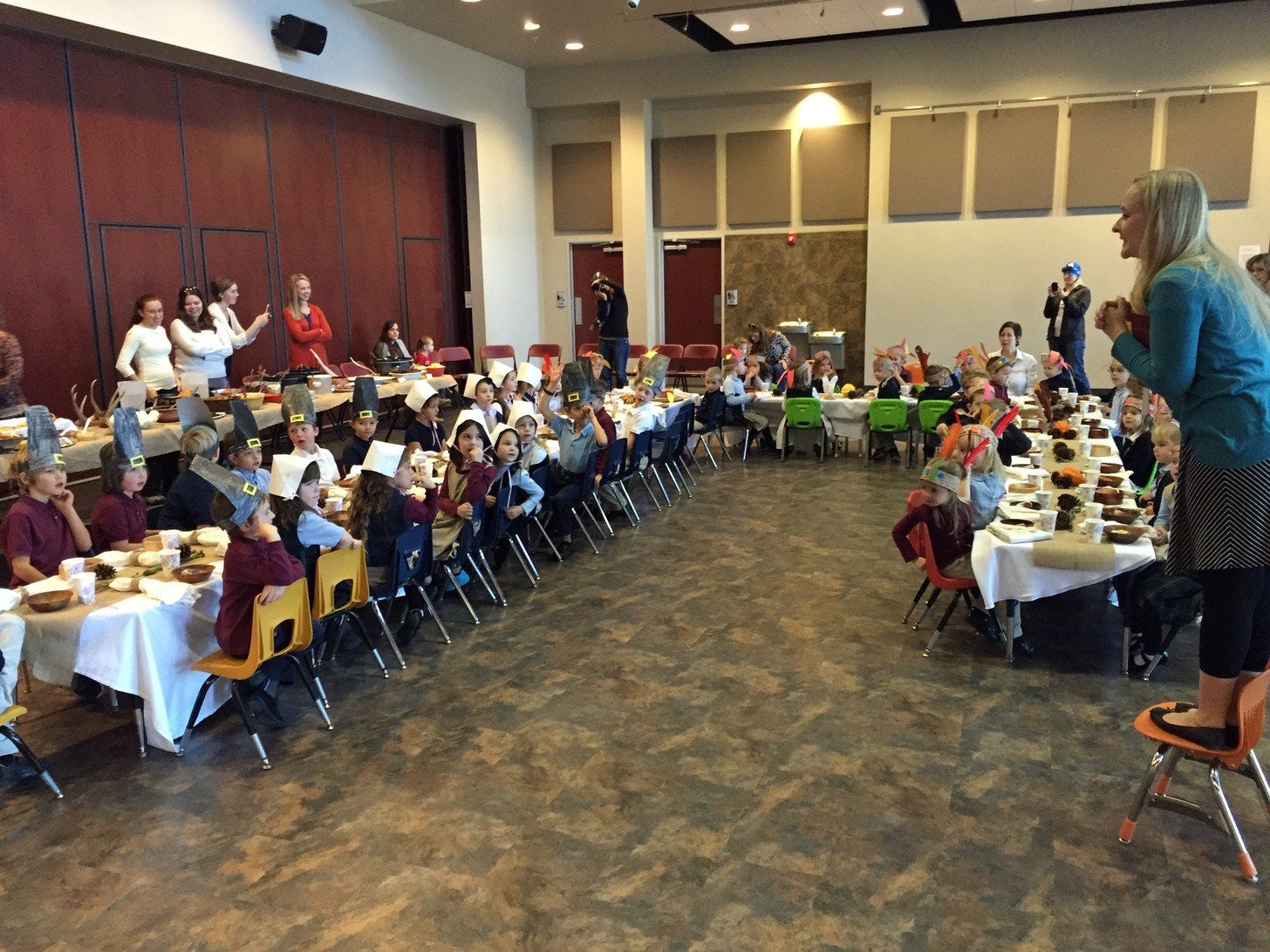Dear Reader,
I didn’t have many submissions in response to last week’s invitation to suggest a song for discussion, but the few I received are worthy. (Don’t have Spotify? Subscribe or listen for free.)
In addition to one of the tunes above, this reader shared a few thoughts:
“I think the idea of having a listening party is outstanding. In some ways, it takes me back to the pre-download days when people would actually get together to share a listen of somebody's latest album. I can remember people coming to hang out in my doom room in college because I had just gotten the latest Rush album, or even going back when I was much younger, I remember some of my older brother's friends coming over to hang out in his room to listen to the latest Zeppelin album.
Maybe this is just a ‘things were so much better in my day’ gripe (I might as well be yelling ‘Get off my lawn!’), but I feel like music was often a much more communal experience a few decades ago. Nobody gets together to share a listen of someone's latest album anymore for two reasons: 1) no one needs to because everything is downloadable instantly with the push of a button; and 2) many younger (say, roughly 30 and under) people don't buy albums anymore, but rather just download certain tracks that they want to have. Those of us who were kids in the 70s/80s or earlier still have songs that, when we hear them getting near the end, we can already hear in our head the song that is supposed to come next, because we listened to albums, not just songs.”
Thanks to everyone who shared a song for the good of the cause. Here’s to hosting your very own listening party (or two) between now and the end of 2021!
As always, thanks for reading,
Craig
P.S.: As a reminder, you’re welcome and encouraged to email me directly with feedback, ideas, links, etc. at cmdunham [at] gmail [dot] com. Just know that, unless you specifically tell me not to, I may quote you here (though it will always be anonymously).
The Journey to 400 Years of Thanksgiving
This year marks the 400th anniversary of the first Thanksgiving in 1621 (a milestone of which I have seen zero coverage). Seeing as how today is the Friday before the holiday (and how next Friday is Black Friday, when I’ll most likely be blathering on about the evils of consumerism, our depraved black-heartedness, etc.), I thought it good to write about Thanksgiving this week with help from one who made it happen.
William Bradford was an English Puritan Separatist who, along with those we now call Pilgrims (including my own relative, Deacon John Dunham) emigrated from northern England to Leiden, Holland, fleeing religious persecution. Bradford and company eventually crossed the Atlantic Ocean, settled Plymouth Colony in Massachusetts Bay in November 1620, and established the first Thanksgiving in November 1621.
Thirty years later, Bradford chronicled the history of the Pilgrim emigration in Of Plymouth Plantation: Bradford’s History of the Plymouth Settlement (1608-1650). Because much English literature of that time paid scant attention to what we now consider “proper” spelling and punctuation, Peaches and I are reading Harold Paget’s 1909 Modern English rendering and hope to finish it by Thanksgiving. It’s wonderful.
So, in this week’s post, we’ve pieced together excerpts of Bradford’s words leading up to their arrival and eventual first Thanksgiving celebration in America 400 years ago. We hope you enjoy!
First Cause of the Foundation of the New Plymouth Settlement
“When by the zeal of some godly preachers, and God’s blessing on their labours, many in the North of England and other parts became enlightened by the word of God and had their ignorance and sins discovered to them, and began by His grace to reform their lives and pay heed to their ways, the work of God was no sooner manifest in them than they were scorned by the profane multitude, and their ministers were compelled to subscribe or be silent, and the poor people were persecuted with apparators and pursuants and the commissary courts. Nevertheless, they bore it all for several years in patience, until by the increase of their troubles they began to see further into things by the light of the word of God. They realized not only that these base ceremonies were unlawful, but also that the tyrannous power of the prelates ought not to be submitted to, since it was contrary to the freedom of the gospel and would burden men’s consciences and thus profane the worship of God.” (p. 6-7)

Flight to Holland (Amsterdam & Leiden): 1607-1608
“For these reformers to be thus constrained to leave their native soil, their lands and livings, and all their friends, was a great sacrifice, and was wondered at by many. But to go into a country unknown to them, where they must learn a new language, and get their livings they knew not how, seemed an almost desperate adventure, and a misery worse than death. Further, they were unacquainted with trade, which was the chief industry of their adopted country, having been used only to a plain country life and the innocent pursuit of farming. But these things did not dismay them, though they sometimes troubled them; for their desires were set on the ways of God, to enjoy His ordinances; they rested on His providence, and knew Whom they had believed.” (p. 9)

Settlement at Leiden: 1609-1620
“They cherished a great hope and inward zeal of laying good foundations, or at least of making some way towards it, for the propagation and advance of the gospel of the kingdom of Christ in the remote parts of the world, even though they should be but stepping stones to others in the performance of so great a work…The place they fixed their thoughts upon was somewhere in those vast and unpeopled countries of America…This proposition when made public, found many different opinions, and raised many fears and doubts. The hopeful ones tried to encourage the rest to undertake it; others more timid, objected to it, alleging much that was neither unreasonable nor improbable. They argued that it was so big an undertaking that it was open to inconceivable perils and angers.” (p. 21-22)
The Leiden Congregation: 1620
“…They decided what number and which of the members should prepare to go first; for not all that were willing to go could settle their affairs in so short a time; nor if all could have been ready, would there have been means of transport for them…It was also decided by mutual consent that those who went should be a separate church, distinct from those who stayed, since, with such a dangerous voyage before them, and removal to such a distance, it might happen that they should never meet again, as a body, in this world. But there was this proviso: that when any of the members at Leiden came over to join the others, or when any of the others returned, they should be received as members without any further testimonial. It was also promised by the rest to those that went first, that if the Lord gave them life and opportunity, they would come to them as soon as they could.” (p. 35-36)
Departure from Leiden: July & August, 1620
“The time having come when they must depart, they were accompanied by most of their brethren out of the city to a town several miles off, called Delfthaven, where the ship lay ready to take them. So they left that good and pleasant city, which had been their resting place for nearly twelve years; but they knew they were pilgrims, and lifted up their eyes to the heavens, their dearest country, and quieted their spirits. When they came to the place, they found the ship and everything ready, and such of their friends as could not come with them followed them, and several came from Amsterdam to see them shipped and to take leave of them. That night there was little sleep for most of them, for it was spent in friendly entertainment and Christian discourse and other real expressions of true Christian love. The next day the wind being fair they went aboard and their friends with them - and truly doleful was the sight of that sad and mournful parting. What sighs and sobs and prayers rose from amongst them! What tears gushed from every eye, and pithy speeches pierced each heart! Many of the Dutch strangers who stood on the quay as spectators, could not refrain from tears. Yet it was comfortable and sweet to see such lively and true expressions of dear and unfeigned love. But the tide which stays for no man called them away, though loth to part; and their reverent pastor, falling down on his knees, and all with him, with watery cheeks commended them with most fervent prayers to the Lord and His blessing. Then with mutual embraces and many tears, they took their leave of one another - which proved to be the last leave for many of them.”
The Mayflower Sails from Plymouth: September-November, 1620
“After they had enjoyed fair winds and weather for some time, they encountered cross winds and many fierce storms by which the ship was much shaken and her upper works made very leaky. One of the main beams amid-ships was bent and cracked, which made them afraid that she might not be able to complete the voyage. So some of the chief of the voyagers, seeing that the sailors doubted the efficiency of the ship, entered into serious consultation with the captain and officers, to weigh the danger betimes and rather to return than to cast themselves into desperate and inevitable peril. Indeed there was great difference of opinion amongst the crew themselves. They wished to do whatever could be done for the sake of their wages, being now half way over; on the other hand they were loth to risk their lives too desperately. But at length all opinions, the captain’s and others’ included, agreed that the ship was sound under the water-line, and as for the buckling of the main beam, there was a great iron screw the passengers brought out of Holland, by which the beam could be raised into its place; and the carpenter affirmed that with a post put under it, set firm in the lower deck, and otherwise fastened, he could make it hold. As for the decks and upper works, they said they would calk them as well as they could; and though with the working of the ship they would not long keep stanch, yet there would otherwise be no great danger, if they did not overpress her with sail. So they committed themselves to the will of God, and resolved to proceed.” (p. 62-63)
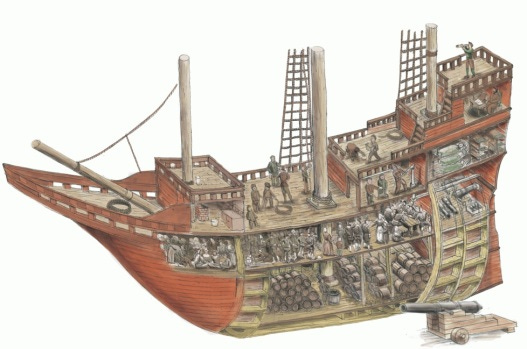
Arrival at Cape Cod: November 11, 1620
“After long beating at sea, on November 11, they fell in with a part of the land called Cape Cod, at which they were not a little joyful. After some deliberation among themselves and with the captain, they tacked about and resolved to stand for the southward, the wind and weather being fair, to find some place near Hudson’s River for the habitation. But after they had kept that course about half a day, they met with dangerous shoals and roaring breakers, and as they conceived themselves in great danger - the wind falling - they resolved to bear up again for the Cape, and thought themselves happy to get out of danger before night overtook them, as by God’s providence they did. Next day they got into the bay, where they rode in safety.” (p. 64)
“Having found a good haven and being brought safely in sight of land, they fell upon their knees and blessed the God of Heaven who had brought them over the vast and furious ocean, and delivered them from all the perils and miseries of it, again to set their feet upon the firm and stable earth, their proper element…But here I cannot but make a pause, and stand half amazed at this poor people’s present condition; and so I think will the reader, too, when he considers it well. Having thus passed the vast ocean, and that sea of troubles before while they were making their preparations, they now had no friends to welcome them, nor inns to entertain and fresh their weather-beaten bodies, nor houses - much less towns - to repair to.” (p. 64-65)

“…As for the season, it was winter, and those who have experienced the winters of the country know them to be sharp and severe, and subject to fierce storms, when it is dangerous to travel to known places - much more to search an unknown coast. Besides, what could they see but a desolate wilderness full of wild beasts and wild men; and what multitude there might be of them they knew not! Neither could they, as it were, go up to the top of Pisgah, to view from this wilderness a more goodly country to feed their hopes; for which way soever they turned their eyes (save upward to the Heavens!) they could gain little solace from any outward objects. Summer being done, all things turned upon them a weather-beaten face; and the whole country, full of woods and thickets, presented a wild and savage view.” (p. 65)

“If they looked behind them, there was the mighty ocean which they had passed, and was now a gulf separating them from all civilized parts of the world. If it be said that they had their ship to turn to, it is true; but what did they hear daily from the captain and crew? That they should quickly look out for a place with their shallop [light sailboat], where they would be not far off; for the reason was such that the captain would not approach nearer to the shore till a harbour had been discovered which he could enter safely; and that the food was being consumed apace, but he must and would keep sufficient for the return voyage. It was even muttered by some of the crew that if they did not find a place in time, they would turn them and their goods ashore and leave them.” (p. 66)
“What, then, could now sustain them but the spirit of God, and His grace? Ought not the children of their fathers rightly to say: Our fathers were Englishmen who came over the great ocean, and were ready to perish in this wilderness; but they cried unto the Lord, and He heard their voice, and looked on their adversity…Let them therefore praise the Lord, because He is good, and His mercies endure forever. Yea, let them that have been redeemed of the Lord, show how He hat delivered them from the hand of the oppressor. When they wandered forth into the desert-wilderness, out of the way, and found no city to dwell in, both hungry and thirsty, their soul was overwhelmed in them. Let them confess before the Lord His loving kindness, and His wonderful works before the sons of men!” (p. 66)

To be sure, Bradford and company were not perfect pilgrims before, upon, or after their arrival in America; he speaks frankly of moral failings - sloth and theft, adultery and deceit, fear and faithlessness - within their ranks. Yet there is much redemption in their story - in their relationships with each other and the Native Americans, in their transition from agricultural failure to success, and in their quest to seek and secure freedom to worship their gracious and forgiving God.
They had much to be thankful for, and as a result of their journey, so do we 400 years later. Happy Thanksgiving.
Post(erity): “Now Thank We All Our God”
Each week, I choose a post from the past that seems apropos of something (of course, you’re always welcome to search the archives yourself whenever you like).
This week’s Post(erity) post - “Now Thank We All Our God” - comes from a November 2015 blog post I wrote highlighting the first Pre-K/Kindergarten Thanksgiving feast I attended as Headmaster at Petra Academy. An excerpt:
“While we gladly join the rest of our country in observing the holiday on Thursday, our reasons for doing so are not particularly ones of patriotism or politeness (though they are not not those things, either); as Christians, we observe Thanksgiving for the purpose of worshiping God, for we cannot be thankful for something without offering thanks to Someone.”
Why Subscribe?
Why not? Second Drafts is a once-a-week newsletter delivered to your inbox (you can also read it online or through your RSS reader) and it’s totally free.
Keep Connected
You’re welcome to follow me on Twitter.




